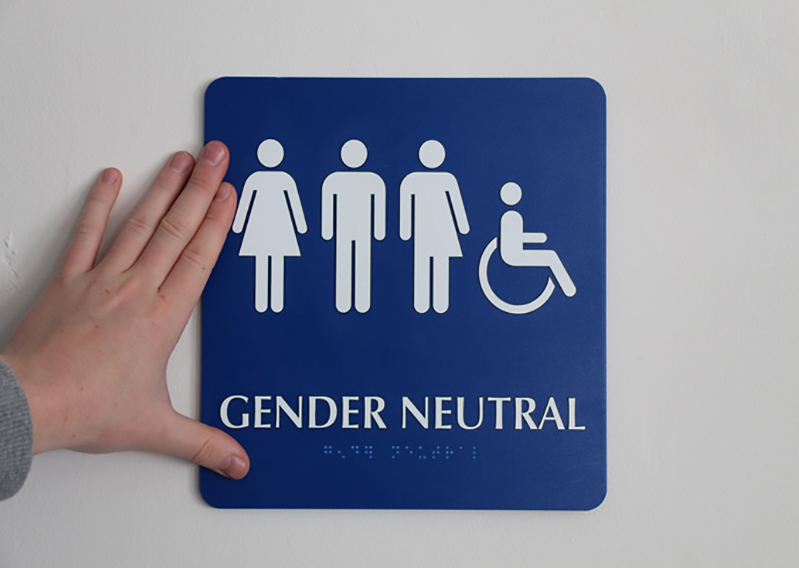
A new statewide law about gender-segregated public bathrooms, facilities and businesses, which went into effect Dec. 26 in Washington, is raising questions about privacy and safety of everyone involved. This first-of-its-kind law created by the Washington State Human Rights Commission is part of the recent push to frame gender-segregated bathrooms as an affront to "equality," stated Joseph Backholm in a blog for Family Policy Institute for Washington.
Backholm said the new rule has created the following situation: "If a man says he is a woman and walks into the women's restroom, it is now illegal for a business owner to intervene."
Backholm appears to be referencing the portion of the new law that states: "If another person expresses concern or discomfort about a person who uses a facility that is consistent with the person's gender identity, the person expressing discomfort should be directed to a separate or gender neutral facility, if available."
He said this topic has been swirling in Washington for a while. School boards throughout Washington state have been wrestling with this issue. Additionally, the YMCA of Pierce and Kitsap County recently made headlines when a policy was created to allow transgender men to use the women's locker room "under any and all circumstances."
However, Backholm states this is the first statewide mandate that "forces businesses to cooperate with a customer's confusion about his or her gender."
In fact, he said the new rule specifically "prohibits businesses and schools the freedom to work out a different situation that might be agreeable to all involved because it forbids businesses from creating a separate, gender-neutral facility for use by those who prefer not to use the bathroom for their gender."
Here is the full language of the new mandate:
"WAC 162-32-060 Gender segregated facilities. (1) Facility use. All covered entities, except school districts or other primary and secondary schools, shall allow individuals the use of gender-segregated facilities, such as restrooms, locker rooms, dressing rooms, and homeless shelters, that are consistent with that individual's gender identity. In such facilities where undressing in the presence of others occurs, covered entities, except for school districts and other primary or secondary schools, shall allow access to and use of a facility consistent with that individual's gender identity. (2) Cannot require use inconsistent with gender identity. A covered entity shall not request or require an individual to use a gender-segregated facility that is inconsistent with that individual's gender identity, or request or require an individual to use a separate or gender-neutral facility. (a) If another person expresses concern or discomfort about a person who uses a facility that is consistent with the person's gender identity, the person expressing discomfort should be directed to a separate or gender neutral facility, if available. (b) Any action taken against a person who is using a restroom, such as removing a person, should be taken due to that person's actions or behavior while in the restroom, and must be unrelated to gender identity. The same standards of conduct and behavior must be consistently applied to all restroom users, regardless of gender identity. (3) Schools. School districts and other primary and secondary schools should allow students to use the restroom that is consistent with their gender identity consistently asserted at school. School districts and other primary and secondary schools should assess the use of locker rooms by transgendered students on a case-by-case basis, with the goals of maximizing the student's social integration and equal opportunity, ensuring the student's safety and comfort, and minimizing the stigmatization of the student. In most cases, transgender students should have access to the locker room that corresponds to their gender identity consistently asserted at school. (4) Provision of options encouraged. Whenever feasible, covered entities are encouraged to provide options for privacy, such as single-use gender-neutral bathrooms or private changing areas, that are available to any individual desiring privacy. "
Backholm also indicates it presents new opportunities for sexual predators to gain access to victims.
"The safety and security of every woman in Washington should not be placed at risk in an attempt to be politically correct. We should be compassionate for the real challenges people face, but we shouldn't be stupid," he said.
Unlike businesses, schools are allowed to assess bathroom situations on a case-by-case basis, Backholm points out. However, "In most cases, transgender students should have access to the locker room that corresponds to their gender identity consistently asserted at school."
Backholm said this arguably creates a conflict with the state's indecent exposure law as well, which otherwise prohibits exposing yourself to others while "knowing that such conduct is likely to cause reasonable affront or alarm."
"Or maybe women no longer have the right to be alarmed at the site of a naked man in the women's locker room," he added.
He said he hopes Washington legislators will fix the rule, which was delegated to the Human Rights Commission.







